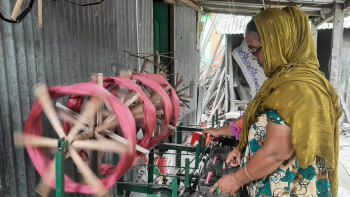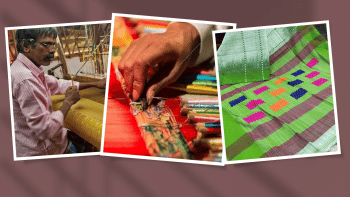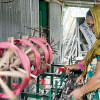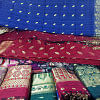Time to challenge India's Tangail GI designation

After India's controversial move to secure the Geographical Indication (GI) rights for Tangail sari, Bangladesh's immediate priority should be undertaking legal measures to defend its rightful claim to the product's origin. As an expert has highlighted in a recent media briefing, there is a three-month window for aggrieved parties to appeal to India's Intellectual Property Appellate Board. While supporting this traditional craft and those associated with it is crucial, securing legal recognition remains paramount.
Typically granted by national organisations, the GI status carries global significance. It assures consumers of authenticity, safeguards producers' reputation and methods, fosters fair competition, and protects intellectual property in international trade. But while Bangladesh's Department of Patents, Designs and Trademarks (DPDT) has been sluggish in recognising products of our heritage—with only 21 registered so far—India has actively and exclusively claimed several heritage items associated with the entire Bengal, including Fazli mango, Nakshi Kantha, Rasgolla, Jamdani, Sundarban honey, and now Tangail sari. India is even attempting to claim Bengal Muslin, a distinguished product of Dhaka.
Whether Bangladesh will appeal to India's Intellectual Property Appellate Board to overturn their decision remains to be seen. But doing this is essential for not only safeguarding our GI rights but also asserting Bangladesh's stance against any appropriation of heritage. Tangail sari, as the name suggests, originated in Tangail under the patronage of local zamindars, woven by communities that migrated from Dhaka. During the Partition, some weavers migrated to West Bengal, carrying the tradition with them. While Bangladesh possesses strong historical claims to the product's origin (a key GI criterion), the legal battle also hinges on skilled handling of the proceedings. Securing top-quality legal representation is thus crucial. Additionally, international support can be sought from organisations like the World Trade Organization.
True, the DPDT has belatedly recognised the Tangail sari as a Bangladeshi GI product. However, this cannot be the end of the story. Proactive efforts are needed to identify and recognise all products of our heritage, seeking diplomatic solutions for shared traditions, and actively supporting these invaluable practices. Reclaiming Tangail sari should thus be a top priority.


 For all latest news, follow The Daily Star's Google News channel.
For all latest news, follow The Daily Star's Google News channel. 









Comments